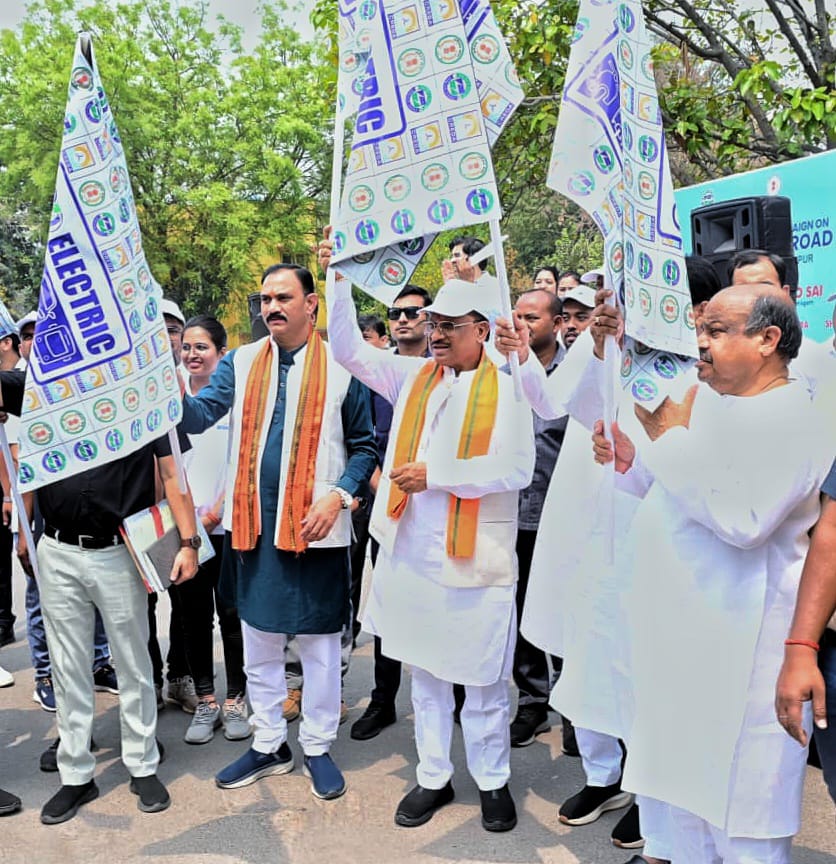Inaugurated the roadshow by flagging off the electric vehicle rally
Use of electric vehicles will prove to be a milestone in achieving the Panchamrit target: Shri Sai
Raipur 16 March 2024 / Chief Minister Shri Vishnu Deo Sai took part in a road safety awareness programme organized by the Chhattisgarh State Renewable Energy Development Agency (CREDA) at his residence today. He inaugurated the roadshow by flagging off the electric vehicle rally. The roadshow commenced from the Chief Minister’s residence, traversing through Bhagat Singh Chowk, Telibandha Chowk, VIP Chowk, and Fundahar, and culminating at the Energy Park.
Addressing the gathering, Chief Minister Shri Sai highlighted the ongoing transportation development efforts nationwide under the leadership of Prime Minister Shri Narendra Modi. He mentioned the Prime Minister’s global announcement of India’s climate action’s five nectar elements (Panchamrit) during the Conference of the Parties (COP26) in Glasgow, Scotland, in 2021. He stated that in alignment with this, CREDA is leading various renewable energy-based projects in the public interest in the state.
Elaborating further, Chief Minister Shri Sai stated that under the Panchamrit target, our nation is dedicated to reducing its dependence on conventional energy sources by 2030, aiming for a transition towards clean energy. To accomplish this objective, the widespread adoption of electric vehicles in the transportation sector will serve as an important milestone.

Shri Sai pointed out the growing trend in the nation towards increased electric vehicle adoption, with Chhattisgarh currently operationalizing 39,802 two-wheeled, 17,956 three-wheeled, and 1,596 four-wheeled electric vehicles. “Electric vehicles not only emit no harmful pollutants but also eliminate the need for petrol or diesel, offering a more cost-effective and sustainable alternative to conventional vehicles”, he said.
He added that through CREDA’s initiatives, essential amenities are being extended to all segments of society through solar plants. Initiatives such as solar agricultural pumps for farmers, electricity and water provisions in remote rural households, and power supply in health centres are indeed a boon for our people. Highlighting the Government of India’s Go Electric campaign as a forward-thinking measure, Chief Minister Shri Sai urged collective commitment towards electric vehicle adoption, advocating for energy conservation and pollution reduction. He urged strict adherence to road safety regulations and maximizing electric vehicle usage.
Food Minister Shri Dayaldas Baghel, Health Minister Shri Shyam Bihari Jayaswal, MLA Shri Purandar Mishra, Energy Department Secretary Shri P. Dayanand, CREDA CEO Shri Rajesh Rana, Public Relations Commissioner Shri Mayank Srivastava, along with other dignitaries, CREDA officials, and students from various educational institutions were present on the occasion.
Panchamrit Yojana: Prime Minister Shri Modi’s approach to India’s climate action
Meanwhile, Prime Minister Shri Narendra Modi, while delivering a ‘national statement’ at the conference held in Glasgow, Scotland, presented a five-point agenda to address the issue of climate change, which he termed as five ‘nectar elements’ (Panchamrit). For the first time on the global stage, Prime Minister Shri Narendra Modi announced commitments from India to combat climate change. The most significant announcement among these is India’s endeavour to achieve the target of net zero carbon emissions by 2070. He mentioned that half of the country’s energy requirements would be fulfilled using renewable sources by 2030. Besides, India aims to reduce carbon emissions by one billion tonnes between 2022 and 2030. As the fourth point, India has set a target to reduce carbon emission intensity by 45 per cent by 2030. The ‘Panchamrit Yojana’ is envisioned to provide a more flexible, sustainable, and inclusive approach to economic development, offering new opportunities to marginalized communities and women. It will undoubtedly play a historic role in the ongoing efforts to combat climate change.
[metaslider id="347522"]

